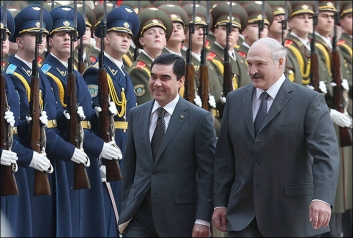Asian policy direction may help to develop Belarusian defence industry
 The situation has not changed
The situation has not changed

Last week, Turkmen President Berdimuhamedov visited Minsk, which was another link in the chain of Belarus developing relations with the Asian countries. As Belarus develops political relations with the Asian counties, she may also develop scientific and industrial cooperation with them in the defence industry.
It should be recalled, that in mid April the Belarusian defence delegation visited Pakistan and in late April, Defence Minister of Indonesia Riamizard Riakudu visited Minsk. That said, Belarusian defence officials discussed the prospects for industrial cooperation in the defence industry with representatives of the three countries.
During the Belarusian-Turkmen summit, Berdumukhamedov made a statement about the strategic nature of bilateral relations, which, according to him, were free from external influences. Both countries committed to developing cooperation on the principles of equality and non-interference in the internal affairs of other countries. The political cooperation between the two countries has been quite good, they have usually supported each other on international fora.
Reportedly, Belarus and Turkmenistan are implementing a high-tech project in Turkmenistan on creating unmanned aircraft systems. Yet during his visit to Turkmenistan on December 10th-12th, 2015, President Lukashenka announced, that Belarusian drones with 50 km range were assembled there (eg “Busel-M”). In addition, Belarusian producers offered ‘Burevestnik’ drones with 290 km range with a possibility to equip with a combat load.
To some extent, Belarusian-Turkmen relations are exemplary from the Belarusian authorities’ viewpoint:
– there is a complete understanding between the leaders of both countries
– there is no value component in the bilateral relations, eg the statement about the respect for sovereignty and non-interference in the internal affairs is exactly about this (eg do not teach us life)
– there is effective demand for Belarusian products, no barriers in mutual trade, Belarus is more technologically advanced than her counterpart
– foreign partners are willing to invest in Belarusian technologies in exchange for access to them.
The latter is particularly important for the domestic defence industry. The international arms market is highly competitive and extremely politicized. National security issues are sensitive for any country and when purchasing arms, the international relations factor is often decisive. Sometimes so that it overshadows the quality and price of the acquired technology.
Asia is a rapidly growing arms market. Modern military systems are packed with electronics, which creates the threat of the so-called producer ‘bugs’, i.e. various software and hardware means, which may disable the equipment. Asian countries, having own geopolitical ambitions are seeking to protect themselves against such surprises while purchasing the necessary technology. The Belarusian military industry has some technological potential, but not always the funds to develop the work in progress. By establishing joint production enterprises, Belarus gains access to local markets and obtains required finds to carry out research and development work.
The warming in Belarus-EU relations has its limits. The Belarusian authorities do not regard the EU and the US as potential strategic partners. The divide is in the value plane: Western values pose an eventual threat to the absolute rule in Belarus. The Belarusian regime is archaic by nature and cannot be integrated in the modern Western world. Minsk understands this very well and therefore carefully chooses the like strategic partners.
Overall, Belarus’ politically motivated strategy to build strategic relations with Asian countries contributes to the development of the national defence industry, which currently is the most successful industrial sector in Belarus. As Belarus develops political relations with the Asian counties, she may also develop scientific and industrial cooperation with them in the defence industry. Due to isolationist sentiments in Russia (the main customer of the Belarusian defence) focusing on substituting all imports, Belarus’ access to Asian markets not only means development for the domestic defence industry, but also guarantees its survival.
Image: Naviny
Subscribe to our newsletter




Situation in Belarus
Constitutional referendum: main consequences


 Video
Video
How to count the political prisoners: are the new criteria needed?


 Video
Video
Paternalism In Decline, Belarusian Euroscepticism, And The Influence Of Russia


 Video
Video











